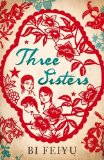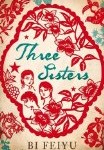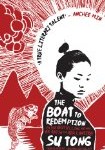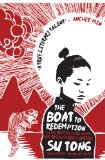 Winner of 2010 Man Asian Literary Prize
Winner of 2010 Man Asian Literary Prize
Translated from the Chinese by Howard Goldblatt and Sylvia Li-chun Lin
Five words from the blurb: sisters, China, power, society, family
Three Sisters gives a fascinating insight into the life of Chinese women in the 1970s. By observing the differences between three sisters we see how the status of their birth position affects everything that happens to them.
The Three Sisters
- Yumi uses her status as the eldest daughter to gain the respect of all those around her. This power ensures that she easily finds a favourable marriage and so has a far greater chance of achieving a happy life.
- Yuxiu, the third sister, must use as much charm as possible to negotiate opportunities for herself.
- Yuyang, the seventh sister, must rely on her talents alone, having none of the power that being an older sibling brings.
The book showed each sister in turn, allowing us to connect to them completely. It did a wonderful job of showing the Chinese culture, particularly by explaining their inner thoughts and fears. The importance of ‘saving face’ was high on all their agendas and this book was great at explaining their actions in an easy to understand, but vivid way.
….everyone in town knew Yuxiu’s secret. She assumed that no one knew, but they all did. This is generally how private matters are treated. It is as if they are screened by a sheet of paper so flimsy it cannot withstand a simple poke but so sturdy everyone will avoid it. Only country folk are so uncouth and impatient that they need to get to the bottom of things at once. Townsfolk aren’t like that at all. Some things are not meant to be poked open; exposing them spoils the fun. What’s the hurry? You cannot wrap fire in paper; sooner or later it will burn through and everything will be exposed. That is more spectacular, more appealing.
I found the last section to be less interesting than the others, but it was still enjoyable. My only complaint is that the book did not end well. I don’t mean that it was sad, just that it was abrupt and didn’t come to any logical conclusions. I would have liked to see all three sisters mentioned on the final pages, not just a slightly odd scene containing only the youngest. This is a minor quibble though. It is a beautifully written book and I’m sure it will be loved by many people.
As an introduction to Chinese literature, this is an ideal choice. It is well paced and contains a depth of emotion. I’d recommend this book to anyone interested in Chinese literature, but I think the focus on family relationships will mean that it will be appreciated by women more than men.


